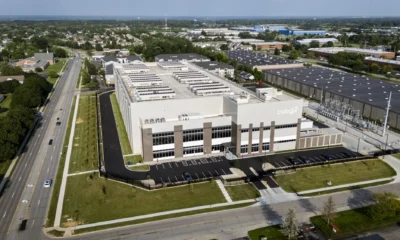Business
Advancements in AI Efficiency: A New Frontier for Business Leadership

When businesses first started using artificial intelligence (AI) for business operations, they were often siloed into performing specific tasks— one model for inventory management, another for pricing, and several for customer service.
But today’s AI models differ significantly from those of years past. With generative AI and open-weight AI, businesses can use best-of-breed specialized AI to streamline across their business operations.
There are three factors for moving toward more efficient AI models:
- With open-weight AI, companies will have the ability to fine-tune already-powerful models across various industries.
- Recently, companies have been working on developing smaller, more efficient AI models, which will enable faster and more cost-effective data processing.
- The increased availability of cloud computing resources allows companies to deploy and scale AI systems without extensive infrastructure costs.
The result is a new generation of AI that can seamlessly integrate into business operations, optimizing processes and scaling with organizational needs through an evolution that is transforming the business world. Companies are already leveraging these advancements to streamline operations, enhance decision-making, and reduce operational costs.
As AI efficiency continues to improve, adopting these solutions is no longer a matter of speculation. It’s actively reshaping the way businesses function.
Shift to Smaller, More Efficient AI Models
Over the years, AI models have become increasingly powerful, but they have required significant infrastructure to support them as well. Today, the trend is shifting toward smaller, more efficient AI models that provide near-state-of-the-art results while consuming fewer resources. Within the right agentic framework, these compact models are capable of performing complex tasks such as decision-making and delivering insights with remarkable speed.
The move to smaller models is driven by the need for businesses to optimize costs while improving performance. By reducing the size of AI models without compromising their capabilities, companies can run advanced systems on more affordable hardware. This shift also has the added benefit of reducing latency, which is particularly important in industries such as retail, finance, and hospitality, where real-time data processing is particularly crucial.
For businesses, the implications are clear: smaller, more efficient AI models not only reduce the need for extensive computing power but also make AI more accessible, enabling faster implementation and scaling without the high costs traditionally associated with large-scale AI systems.
A Shift Toward Customization
As AI technology matures, businesses are increasingly moving toward customized solutions tailored to their specific needs. While off-the-shelf AI tools can be effective for general tasks, they often lack the depth and specificity required to tackle industry-specific challenges.
More companies are focused on developing AI models trained on their unique datasets, optimizing them for the specific nuances of their operations. This industry-specific approach has led to faster deployments and more relevant AI systems that deliver precise, actionable insights. Whether it’s refining customer segmentation models in retail, improving predictive maintenance in manufacturing, or enhancing personalized guest experiences in hospitality, customized AI models are proving more effective in meeting the specific needs of these sectors.
For businesses, the key takeaway is that AI isn’t a one-size-fits-all solution. Developing tailored AI models allows companies to gain a competitive edge by addressing their unique operational challenges with precision. This move toward customization is not only accelerating the deployment of AI but also increasing its relevance and impact across different industries.
Open-Weight Models
The introduction of open-weight AI models has further accelerated the efficiency of AI applications. Unlike closed systems, which are controlled by a single vendor and often require significant licensing fees, open-weight models allow businesses to access, modify, and deploy AI systems that are customized for their needs.
One of the primary advantages of open-weight AI is the level of control it gives businesses over their systems. Companies can adapt these models to fit their specific operational needs, fine-tuning them to process proprietary data more effectively. Additionally, companies can host open-weight AI models on their own infrastructure, keeping sensitive data in-house while still benefiting from cutting-edge AI capabilities.
The shift to open-weight models has not only reduced the costs associated with proprietary AI solutions but also made AI more accessible to smaller businesses. With the ability to scale AI models more easily and make adjustments as needed, companies can innovate without being dependent on third-party vendors.
Financial, Operational Benefits of AI Efficiency
The increased efficiency of AI models directly impacts a company’s bottom line. Smaller, more efficient models reduce the need for costly hardware and cloud services, enabling businesses to lower their operational costs. Furthermore, the ability to build custom models tailored to specific business functions means AI can deliver more precise results, thereby enhancing decision-making and overall performance.
The impact of AI efficiency isn’t limited to cost savings. By streamlining business processes, AI enables companies to automate routine tasks, minimize human errors, and expedite the time-to-market (TTM) for new products and services. Whether it’s optimizing supply chains, refining marketing strategies, or improving customer support, the financial and operational benefits of AI efficiency are clear.
For organizations already using AI, adopting more efficient models offers an opportunity to further optimize operations, refine existing AI systems, and ensure that AI investments deliver maximum return. As AI continues to evolve, businesses that embrace these advancements will be better positioned to meet the demands of a competitive marketplace.
Key Competitive Advantage
The shift toward more efficient AI models is changing the landscape of business operations. Smaller, more efficient models, customized AI solutions, and open-weight systems are making it possible for businesses to harness the full potential of AI while reducing costs and improving performance. This new generation of AI is not only more accessible but also more adaptable to the specific needs of different industries.
For businesses, integrating these advanced AI systems into operations represents a significant opportunity. As AI continues to evolve, the companies that leverage these advancements will be better equipped to stay ahead of the competition, improve efficiency, and achieve long-term success.
AI efficiency is no longer a future goal but a present reality. Embracing these technologies today is the key to thriving in an increasingly data-driven and competitive market.
Business
Trade, Energy, AI Dominate Kazakhstan–China Business Council

ASTANA — President Kassym-Jomart Tokayev described China as Kazakhstan’s destined neighbor, close friend, and long-term strategic partner during the Sept. 2 Eighth Meeting of the Kazakhstan–China Business Council in Beijing, Akorda press service reported.
Photo credit: Akorda
He noted that bilateral trade reached a record $44 billion last year, and emphasized the two countries’ intention to push this figure even higher over the next five years, backed by strong political will at the highest level. China has already invested $27 billion in Kazakhstan, with more than 6,000 Chinese-backed enterprises operating in the country, ranging from giants such as CNPC, Sinopec, CITIC, and Huawei to mid-sized businesses. Tokayev described his talks with President Xi Jinping as productive, voicing confidence in the partnership’s future.
He underlined Kazakhstan’s steady economic growth, with GDP expected to surpass $300 billion by year’s end. Reforms such as the National Digital Investment Platform, a new Investment Headquarters, and the recent bilateral investment protection agreement, coupled with a visa-free regime, have all strengthened the investment climate. Tokayev said Kazakhstan and China share vast untapped potential — and now is the time to unlock it.
Transport and logistics
Kazakhstan, as a close neighbor and reliable partner, fully supports and actively participates in President Xi Jinping’s Belt and Road Initiative, Tokayev said. The country accounts for 85% of all continental freight between China and Europe. The commissioning of the second track on the Dostyk–Mointy railway this year will increase the corridor’s transit capacity fivefold.
Meanwhile, freight volumes along the Trans-Caspian International Transport Route grew 62% last year to 4.5 million tons, with a target of 10 million tons in the near future. President Tokayev noted that shipments through Kazakhstan’s Caspian ports, specifically Aktau and Kuryk, are also growing steadily. Additionally, key joint infrastructure projects, such as the Kazakhstan–China logistics terminal in Lianyungang and the dry port in Xi’an, are already operational.
“For Chinese companies, Kazakhstan’s transit potential opens tremendous opportunities,” Tokayev said.
Energy and nuclear cooperation
Tokayev outlined major projects in the energy sector, including a $7.4 billion polyethylene plant in the Atyrau region with Sinopec and the planned modernization of the Shymkent oil refinery with CNPC. Renewable projects are also in focus, including initiatives with China Power International Holding and China Energy, as well as the construction of a 160 MW gas-steam power plant in Mangystau with China Huadian Corporation.
He added that Kazakhstan and China agreed to expand cooperation in the nuclear industry, involving Chinese technologies and specialist training. CNNC will play a central role, while SANY Corporation continues to expand its presence in Kazakhstan’s energy market. Tokayev emphasized that traditional energy sources remain crucial to Kazakhstan’s security, but joint projects across the sector will strengthen the mutually beneficial partnership.
Large-scale mining and metallurgical projects with Chinese firms are underway, including Fujian Hengwang Investment’s steel plant in Zhambyl region (three million tons annual capacity) and Jiaxin International’s tungsten ore processing project in Almaty region.
In construction and manufacturing, Tokayev cited China Glass’s new glass plant, a forthcoming multi-brand auto plant in Almaty with a capacity of 120,000 vehicles annually, producing GWM, Chery, and Changan models, and a new BYD electric bus plant in the same city.
“These projects diversify Kazakhstan’s economy and expand its export-oriented base. These are only a few examples,” he said.
Adding momentum, Tokayev and Chinese Vice Premier Ding Xuexiang jointly inaugurated Kazakhstan’s first wind energy components plant in the Zhambyl region via videoconference. The facility, built through a partnership between Samruk-Kazyna and SANY Renewable Energy, will produce gondolas, hubs, towers, and other key components for wind farms, boosting Kazakhstan’s green energy capacity. Located in the Silk Road Special Economic Zone in Shu, it will play a vital role in expanding renewable energy across the country.
Agriculture and digital economy
Tokayev reminded that Kazakhstan is the world’s sixth-largest holder of arable land and a top-ten grain exporter, supplying over 10 million tons of wheat and 2 million tons of flour annually. He said Kazakhstan can supply up to 2 million tons of grain each year to China. Beyond exports, Kazakhstan seeks to develop joint processing industries, highlighting Dalian Group’s deep grain processing plant in Akmola region and Fufeng Group’s corn-processing project in Zhambyl region, aimed at exports to China and Europe. He also invited Chinese partners to cooperate in producing organic and high-quality livestock products.
On digitalization, Tokayev praised China’s global achievements in the field and cited forecasts that the AI market could reach $5 trillion by 2033, accounting for 30% of the global tech industry. He mentioned that at the Shanghai Cooperation Organization summit in Tianjin, he supported China’s initiative to establish a Global Organization for AI Cooperation. Kazakhstan, he added, is systematically developing its digital economy, having launched Central Asia’s first supercomputer and the Alem.AI International AI Center this year. The construction of Alatau City, envisioned as a hub for innovation, crypto, and tech entrepreneurship, is underway and will soon receive special ecosystem status.
Finance and investment
Tokayev also called for deepening cooperation in finance, noting that the Astana International Financial Centre now hosts over 4,200 companies from dozens of countries, including 850 from China. In partnership with leading Chinese banks, the Development Bank of Kazakhstan recently issued its debut eurobonds in Chinese yuan (Dim Sum bonds), a first for Central Asia, which strengthened international investor confidence in Kazakhstan’s financial system.
Tokayev emphasized that Kazakhstan has created the most favorable conditions for large-scale investments and ambitious projects. He assured Chinese business leaders that they will find reliable partners and unique opportunities in Kazakhstan.
“I am confident that the agreements reached today will boost economic interaction and give new momentum to our strategic partnership. These goals fully align with Kazakhstan’s national interests, which is why their implementation will remain under close attention of the top leadership,” he said.
The Kazakhstan–China Business Council concluded with the signing of over 70 commercial documents worth $15 billion.
Business
UK long-term borrowing costs on brink of 27-year high; gold price hits record – business live | Business

Key events
Traders have also been piling into silver, driving it over $40 per ounce for the first time since 2011.
KCM Trade’s chief market analyst, Tim Waterer, says:
“Silver is making a move higher in response to expectations of lower U.S. rates, while a tight supply market is helping to maintain an upward bias.”
Gold hits record high over $3,500/oz
The gold has hit a new alltime high, as traders turn to precious metals as a safe-haven asset in inflationary times.
While government bond prices are falling (driving up yields), the spot price of gold has climbed over the $3,500 mark to hit $3,508.50 an ounce early this morning, with investors flocking to this traditional safe-haven asset.
The rally comes as the markets anticipate interest rate cuts in the US later this year, which has weakened the dollar.
Traders have been piling into gold-focused exchange traded funds (ETFs), which lifts demand for the precious metals, while some central banks have been adding to their own holdings.
Worries about inflation have also lifted demand for gold, as Tony Sycamore, IG analyst, explains:
This week’s rally in gold and silver began mid-morning yesterday and coincided with a social media post by US President Trump who claimed that prices in the USA are “WAY DOWN” with virtually no inflation.
However, this narrative contrasts with recent economic data showing persistent inflationary pressures remain and comes as President Trump continues his dovish reshaping of the Fed Board as he pushes for sooner and deeper Fed interest rate cuts, into an economy which is growing at ~3.5% in Q3 according to the latest Atlanta Fed GDP Now reading
UK long-term borrowing costs on brink of 27-year high
Good morning, and welcome to our rolling coverage of business, the financial markets and the world economy.
The bond vigilantes are back, piling pressure on governments in London and Paris amid fears over fiscal sustainability.
The UK’s long-term cost of borrowing is on the verge of hitting its highest level since 1998. Yesterday the yield, or interest rate, on Britain’s 30-year debt rose as high as 5.646%, just a whisker from the 27-year high of 5.649% set during trading on 9th April.
That pushes up the cost of adding to Britain’s national debt, eating into the headroom available to chancellor Rachel Reeves as she draws up the autumn budget.
Bond vigilantes punish governments for what they consider to be bad policy choices, by shunning debt auctions or by demanding higher and higher rates of return before buying government bonds.
Fiscal concerns have been pushing up long-term borrowing costs globally in recent weeks; September is traditionally a tough month for the bond markets, so the next few weeks could be volatile.
UK debt is in the firing line due to fears that the economy will slow later this year, and that Reeves faces a budget black hole that will need to be filled through either tax rises or spending cuts.
As Deutsche Bank’s chief UK economist, Sanjay Raja, told clients:
At the risk of sounding a little dramatic, the Autumn Budget will be a defining moment for the UK. On our estimates, a fiscal hole worth GBP 20-25bn will need to be filled in November.
Kathleen Brooks of XTB says August was “dreadful” for UK bonds, explaining:
This summer’s drip feed of potential tax rises has not gone over well with voters, and Labour has been hemorrhaging support to Reform in recent weeks. Essentially voters don’t want tax rises, while Labour backbenchers don’t want spending cuts, but something will have to give.
Political turmoil in Paris has pushed France’s bond yields higher in recent weeks too, widening the gap with Germany. The French government could fall next week, if it loses a confidence vote called over unpopular spending cuts.
French 30-year bond yields hit a multi-year high of nearly 4.5% yesterday.
France’s 30-year government bond yield is now the highest since 2008 (green). We’re in a new world. COVID landed us with a global debt overhang. There’s no room for big deficits now, because markets’ appetite for more debt is low. The right response is to reform. Not cap yields. pic.twitter.com/jzYuD4evLy
— Robin Brooks (@robin_j_brooks) September 1, 2025
ING fear French bonds could continue to be pummelled by political uncertainty, telling clients:
The spread between French government bonds (OATs) and the German equivalent (Bunds) widened materially on the prospect of a confidence vote, and we still see the balance of risk tilted to further widening. The current 10Y spread is at a similar level to that seen in July 2024, when French President Emmanuel Macron called snap elections and OATs sold off significantly in response.
The agenda
Business
Trump says India offered to remove tariffs on US goods

US President Donald Trump says India has offered to cut its tariffs “to nothing” even as he called the current trade stalemate with the country “a totally one sided disaster”.
US tariffs of 50% on goods from India – which includes 25% penalty for Delhi’s refusal to stop buying oil from Russia – took effect last week.
India has not responded to Trump’s latest comment but such war of words over Russian oil has caused Delhi-Washington ties to hit an all-time low.
Trump’s comment coincides with Indian Prime Minister Narendra Modi attending the Shanghai Co-operation Organisation (SCO) summit in Tianjin where he met Chinese President Xi Jinping and Russian President Vladimir Putin.
Washington says Delhi has been indirectly funding Russia’s war in Ukraine.
“India buys most of its oil and military products from Russia, very little from the US,” Trump wrote, adding Delhi should have cut tariffs “years ago”.
Delhi has previously said that oil supply from Russia was vital to meet the energy needs of its vast population.
It has also called the tariffs “unfair, unjustified and unreasonable”.
Last week, the country’s commerce minister, Piyush Goyal, said India “will neither bow down nor ever appear weak” in its economic relationships with other countries.
He also said the country was ready to a have a free-trade agreement with anyone who wanted it.
On Monday, Trump wrote: “What few people understand is that we do very little business with India, but they do a tremendous amount of business with us. In other words, they sell us massive amounts of goods, their biggest “client,” but we sell them very little – Until now a totally one sided relationship, and it has been for many decades.”
The US was, until recently, India’s largest trading partner and the tariffs have sparked fears that exports and growth in the world’s fifth largest economy could suffer.
At the SCO summit, Modi was seen shaking hands with Putin ahead of a meeting hosted by Xi.
The SCO, whose members include China, India, Iran, Pakistan and Russia, is seen as a challenge to Trump and US dominance on a global level.
Putin and Modi later spent 45 minutes inside the Russian leader’s car – after which Modi posted a picture of their journey alongside the compliment to Putin.
The Indian PM said he had an “insightful” exchange with Putin.
-

 Business4 days ago
Business4 days agoThe Guardian view on Trump and the Fed: independence is no substitute for accountability | Editorial
-
Tools & Platforms3 weeks ago
Building Trust in Military AI Starts with Opening the Black Box – War on the Rocks
-

 Ethics & Policy1 month ago
Ethics & Policy1 month agoSDAIA Supports Saudi Arabia’s Leadership in Shaping Global AI Ethics, Policy, and Research – وكالة الأنباء السعودية
-

 Events & Conferences3 months ago
Events & Conferences3 months agoJourney to 1000 models: Scaling Instagram’s recommendation system
-

 Jobs & Careers2 months ago
Jobs & Careers2 months agoMumbai-based Perplexity Alternative Has 60k+ Users Without Funding
-

 Funding & Business2 months ago
Funding & Business2 months agoKayak and Expedia race to build AI travel agents that turn social posts into itineraries
-

 Education2 months ago
Education2 months agoVEX Robotics launches AI-powered classroom robotics system
-

 Podcasts & Talks2 months ago
Podcasts & Talks2 months agoHappy 4th of July! 🎆 Made with Veo 3 in Gemini
-

 Education2 months ago
Education2 months agoAERDF highlights the latest PreK-12 discoveries and inventions
-

 Podcasts & Talks2 months ago
Podcasts & Talks2 months agoOpenAI 🤝 @teamganassi





















